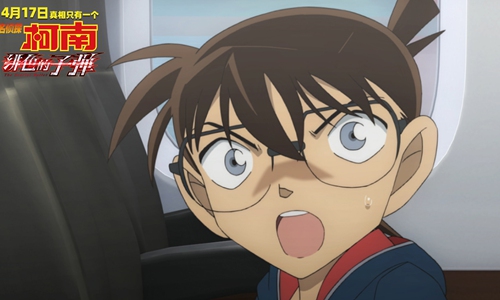ARTS / CULTURE & LEISURE
Need for TV and film rating system becomes center of discussion as 1,465 examples of behavior that could be harmful to children discovered in 21 Chinese and overseas cartoons

Promotional material for Detective Conan: The Scarlet Bullet. Photo: Courtesy for film
The Consumer Rights Protection Committee in East China’s Jiangsu Province published a report on Wednesday that said it had discovered 1,465 examples of objectionable behavior that could be harmful to children in 21 Chinese and foreign cartoons broadcast in China such as Japan’s Detective Conan and Ultraman Tiga.
The report, based on a survey of parents in the province, has sparked numerous hot discussions on Chinese social since its release, leading many netizens to once again call for the implementation of a rating system for TV and film content, while other netizens called for parents to supervise their children more instead of just blaming cartoons for any accidents that may occur.
According to the survey results, there are four main things that parents are unhappy about in cartoons: depictions of violent crime, dangerous behavior that is easily imitated, dark and negative content and overuse of product placements.
The report listed some specific examples such as in the seventh episode of the English cartoon Peppa Pig, characters ride on a giant pumpkin that is being airlifted by a helicopter, which the committee considers dangerous as it may mislead children into thinking it is safe to climb high places.
Another scene from the cartoon that parents said they were unhappy with shows a character falling down from an airplane. Some netizens remarked that they did not understand why these parents were making a fuss.
“I don’t believe children would jump down from a plane after watching the cartoon,” a netizen wrote.
However, there have been some incidents in which children have come to harm while imitating cartoons.
In March 2017, a five-year-old girl who was locked at home alone and left to watch cartoons suffered serious injuries after jumping from the 11th floor with an umbrella in imitation of a cartoon scene.
Over in Northwest China’s Shaanxi Province, a 10-year-old girl cut off her younger sister’s nose with an electric saw in March 2016, after watching a similar scene in a cartoon.
Similar cases that still make parents’ hearts flutter have taken place in many places in China.
Xiong Bingqi, director of the 21st Century Education Research Institute in Beijing, told the Global Times that a rating system for cartoons that could act as a guide for parents is necessary.
“Children under 14 years of age may imitate cartoon characters and fantasize about having superpowers due to a lack of common sense and ability to recognize what is real, so cartoons for them should not depict any sex, violence or dangerous behaviors,” Xiong said.
The rating system can help parents indentify which cartoons are appropriate for their children in different ages and meanwhile, can meet needs of adults to animations with contents including sex, violence and darkness. This is why the system has been called on all the time.
“People should not think that the establishment of a rating system is a way to allow violent or pornographic content in film and television works, or that it will lead to the spread of such works,” the expert added.
Whether or not a rating system is established, parents should always be the first line of defense for children, said Cheng Qingsong, a Chinese film critic, adding that it is necessary for parents to accompany and guide their children when watching cartoons.
Some netizens commented that parents should not place blame on cartoons, but should reflect on their own parenting skills.
According to media reports, in July 2020 parents sued a Chinese cartoon in which characters had dyed their hair different colors for misleading children. The case exploded on Sina Weibo, where the related hashtag earned more than 600 million views.

